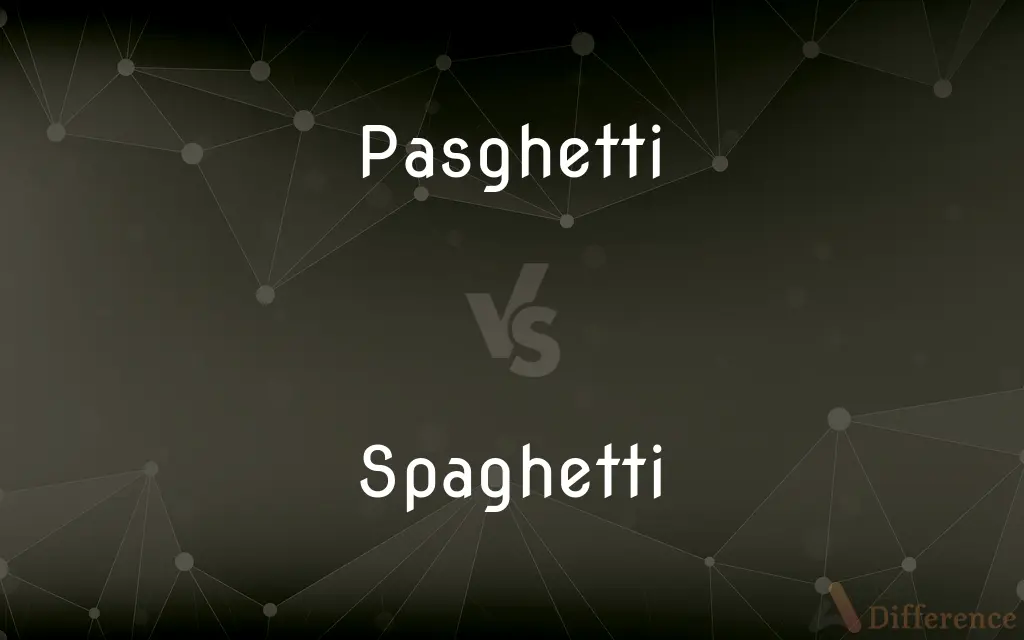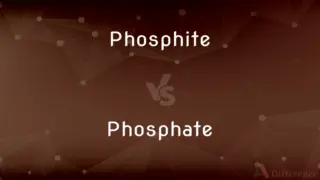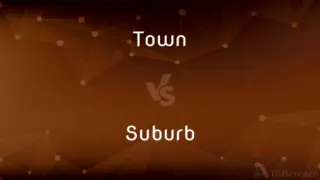Pasghetti vs. Spaghetti — What's the Difference?
By Urooj Arif & Maham Liaqat — Updated on March 15, 2024
"Pasghetti" is a common mispronunciation of "spaghetti," often used by young children or playfully by elders, while spaghetti refers to the long, thin pasta strands of Italian origin.

Difference Between Pasghetti and Spaghetti
Table of Contents
ADVERTISEMENT
Key Differences
The term "pasghetti" doesn't refer to a distinct type of pasta but is instead a playful or incorrect variation of the word "spaghetti" used primarily by children learning to speak or by elders in a humorous context. Spaghetti, on the other hand, is a well-known type of pasta characterized by its long, thin, cylindrical shape. Originating from Italian cuisine, spaghetti is a staple in many dishes around the world, famous for its versatility and ease of preparation.
"Pasghetti" reflects the common phenomenon where complex words are simplified in early language development or used affectionately in casual conversation. While It serves as the base for a multitude of recipes, from the classic spaghetti bolognese to spaghetti aglio e olio, and is celebrated for its ability to pair well with various sauces, meats, and vegetables.
The mispronunciation "pasghetti" highlights how language can be playful and adaptive, especially in the context of family or informal settings. In contrast, "spaghetti" represents not only a specific type of pasta but also the rich culinary traditions of Italian cuisine and its global influence.
While "pasghetti" might evoke a sense of nostalgia or amusement, understanding the correct term "spaghetti" is essential for culinary literacy and appreciation of the dish's cultural origins and culinary versatility.
Comparison Chart
Definition
A playful or incorrect pronunciation of "spaghetti."
A type of long, thin, cylindrical pasta of Italian origin.
ADVERTISEMENT
Origin
Result of language simplification or playful use.
Italian cuisine, with historical roots in Mediterranean diets.
Culinary Use
Non-specific, more related to language than cuisine.
Used in a variety of dishes, often with tomato or meat sauces.
Cultural Significance
Reflects language development and playful communication.
Integral to Italian and global cuisine, with versatile recipes.
Context of Use
Commonly used by children or in informal, playful settings.
Used in culinary contexts, from home kitchens to restaurants.
Compare with Definitions
Pasghetti
Childlike or playful mispronunciation of "spaghetti."
The toddler excitedly asked for a bowl of pasghetti for dinner.
Spaghetti
Long, thin, cylindrical pasta of Italian origin.
They twirled forks of spaghetti, enjoying the rich tomato sauce.
Pasghetti
Used affectionately in casual conversation.
She teased her friend, asking if he wanted some pasghetti with his meatballs.
Spaghetti
Staple ingredient in numerous traditional and modern dishes.
Spaghetti carbonara is a classic, creamy pasta dish loved worldwide.
Pasghetti
Often evokes a sense of nostalgia or warmth.
Hearing pasghetti reminded her of her childhood meals.
Spaghetti
Versatile pasta that pairs well with various sauces and toppings.
For a quick meal, they tossed spaghetti with garlic, oil, and chili flakes.
Pasghetti
Reflects early language development and endearing errors.
His first word was pasghetti, much to his parents' amusement.
Spaghetti
Subject to various cooking techniques and recipes.
She experimented with spaghetti, incorporating unconventional ingredients for a fusion dish.
Pasghetti
Not a recognized term in culinary contexts.
Despite the mispronunciation, everyone knew he meant spaghetti.
Spaghetti
Represents Italian culinary traditions and global adaptation.
Spaghetti bolognese, though not traditional in Italy, has become a global favorite.
Pasghetti
Spaghetti
Spaghetti
Spaghetti (Italian: [spaˈɡetti]) is a long, thin, solid, cylindrical pasta. It is a staple food of traditional Italian cuisine.
Spaghetti
Pasta made in solid strings, between macaroni and vermicelli in thickness.
Spaghetti
Pasta in long, often thick strands.
Spaghetti
(Electricity) A slender tube of insulating material that covers bare wire.
Spaghetti
A type of pasta made in the shape of long thin strings.
Spaghetti
(by extension) A dish that has spaghetti as a main part of it, such as spaghetti bolognese.
Spaghetti
(informal) Any type of pasta.
Spaghetti
(informal) Electrical insulating tubing.
Spaghetti
(informal) Anything tangled or confusing.
Spaghetti
(countable) A spaghetti western.
Spaghetti
Spaghetti code.
Spaghetti
To become, or appear to become longer and thinner.
The cables spaghettied onto the shoulder of the technician.
Spaghetti
To stretch to become longer and thinner.
He spaghettied the referee when he landed on him.
Spaghetti
A variety or macaroni made in tubes of small diameter.
Spaghetti
Pasta in the form of long strings
Common Curiosities
How is spaghetti traditionally served?
Spaghetti is traditionally served with a variety of sauces, such as marinara, bolognese, or aglio e olio, often accompanied by grated cheese.
Is "pasghetti" a type of pasta?
No, "pasghetti" is not a type of pasta but a mispronunciation of "spaghetti."
Does spaghetti have nutritional value?
Spaghetti, especially whole grain versions, can be a good source of carbohydrates, fiber, and nutrients, though its nutritional value depends on the preparation and accompanying ingredients.
Are there other common mispronunciations similar to "pasghetti"?
Yes, children often simplify complex words in various ways, such as "nana" for banana or "lellow" for yellow, reflecting natural language development.
Is it appropriate to use "pasghetti" in formal writing or communication?
It's best to use the correct term "spaghetti" in formal writing or communication. "Pasghetti" is more suited for informal contexts, humor, or when quoting someone who used the term.
How can one avoid mispronunciations like "pasghetti"?
Exposure to correct pronunciations and patient correction can help, though it's important to remember that such mispronunciations are a natural part of language learning, especially for children.
Are there any cultural variations of spaghetti in different countries?
Yes, spaghetti has been adapted into various cuisines worldwide, leading to unique dishes that reflect local flavors and ingredients, beyond its Italian origins.
Can "pasghetti" refer to a specific type of pasta dish?
No, "pasghetti" does not refer to a specific type of pasta dish; it is simply a mispronunciation or playful variation of the word "spaghetti."
Is "pasghetti" recognized in any dictionaries?
"Pasghetti" may appear in informal dictionaries or discussions of language development but is not recognized in standard culinary or general dictionaries as a correct term.
Does "pasghetti" have the same cooking methods as "spaghetti"?
Since "pasghetti" is just a playful or incorrect way to say "spaghetti," the cooking methods would be the same as for traditional spaghetti.
Is "pasghetti" a recognized word in the English language?
"Pasghetti" is not officially recognized in standard English dictionaries; it's more of a colloquial or playful term stemming from the mispronunciation of "spaghetti."
Why do some children say "pasghetti" instead of "spaghetti"?
Children might say "pasghetti" due to the challenges of pronunciation, as the correct pronunciation of "spaghetti" can be difficult for young speakers still developing their language skills.
Is "pasghetti" ever used in literature or media?
"Pasghetti" might appear in children's literature, cartoons, or family-oriented media to reflect the playful or humorous aspects of language and childhood.
Share Your Discovery

Previous Comparison
Phosphite vs. Phosphate
Next Comparison
Town vs. SuburbAuthor Spotlight
Written by
Urooj ArifUrooj is a skilled content writer at Ask Difference, known for her exceptional ability to simplify complex topics into engaging and informative content. With a passion for research and a flair for clear, concise writing, she consistently delivers articles that resonate with our diverse audience.
Co-written by
Maham Liaqat













































